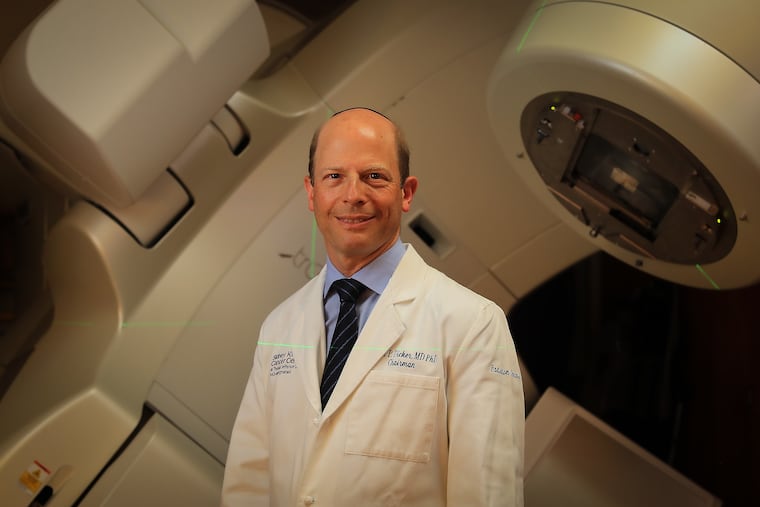Jefferson research looks to outer space to learn about human health on Earth
Cancer treatments can pummel the body to knock out tumors, leading to deteriorating bones, infections, and haywire sleep. But others have observed similar ailments in healthy people: astronauts.

As an oncologist, Adam Dicker has seen how cancer treatments can pummel the body to knock out tumors, sometimes leading to deteriorating bones, more infections, and haywire sleep cycles. But others have observed similar ailments in a group of healthy people: astronauts who spend time in space.
Next year, Dicker and fellow researchers at Sidney Kimmel Medical College at Thomas Jefferson University will launch three studies of how space travel affects aspects of the human body — immunity, microbes in urine, and stress — as part of the first private mission to the International Space Station. Researchers believe that the unique environment in space can also shed light on human health on Earth.
“I never thought I’d ever do a project in space,” said Paul H. Chung, assistant professor of urology at Sidney Kimmel Medical College, who is involved in one of the space studies. “Most people don’t even know the logistics of how someone would do a project in space.”
The eight-day mission is the first of its kind to be approved by NASA. Organized by Axiom Space, on Jan. 22, 2022, a SpaceX rocket will ferry four paying passengers to the International Space Station along with 44 scientific experiments commissioned by the Ramon Foundation and the Israel Space Agency. So far one passenger, former Israeli fighter pilot Eytan Stibbe, has volunteered to participate in the studies.
Dicker, professor and chair of radiation oncology at Jefferson, said the immune system in particular takes a beating in both astronauts and people undergoing cancer treatment.
“Astronauts aren’t as immunosuppressed as cancer patients, but thematically we saw a linkage,” Dicker said. “No one has really studied the immune system in a comprehensive way with astronauts.”
Astronauts who have previously returned from space missions have become easy targets for viruses that were lying dormant in their bodies for years, like the herpes virus that causes shingles. To figure out how space might weaken the immune system, Dicker’s team will collect blood from the participating space travelers before and after their journey and measure more than 7,000 proteins. Previous studies have measured changes to DNA, but measuring proteins — which are made based on DNA and carry out tasks in the body — gets closer to what matters, Dicker said.
He’s hoping to see patterns in groups of immune proteins that rise or fall while the astronauts are in space, which could point to ways to improve immune function for astronauts and Earth-dwellers alike.
For cancer patients, Dicker said this could shed light on how the immune system responds to the stressors of treatment, which mirror an astronaut’s experience in space: physical stress, emotional stress, gastrointestinal problems, disturbed sleep.
Chung is counting on space to help him study the microbiome, the trillions of microscopic organisms living inside the human body. There’s a myth that urine is sterile, but as a urologist, Chung knows better; it’s actually full of microbes like bacteria and fungi. The microbiome is better studied in the digestive system, where the more friendly varieties of bacteria can help digestion while others can cause discomfort. But the urinary microbiome is murkier, and scientists still don’t know how it changes, Chung said.
“Putting someone in space and studying the microbiome is kind of the most extreme thing that you could potentially do in regards to diet and gravity,” Chung said. “If we can see changes in the microbiome in space, then that will help us to better understand how changes in the microbiome may occur on Earth.”
Urine is also no laughing matter in space: Being unable to urinate warrants a NASA rescue mission, and astronauts are at high risk of developing kidney stones or urinary tract infections.
Astronauts will use a mess-free apparatus — similar to toilets on board the shuttle — to collect and freeze urine. Back on Earth, scientists will sequence the genetic material in the urine to figure out what types of microbes it contains.
It’s trickier to collect human samples in outer space than in Philadelphia. Dicker decided not to collect blood samples while the astronauts were in space because of the risk of making them anemic and the weight — and cost — the equipment would add to the delicately balanced space shuttle.
In a third study, Jefferson brain scientists will continue their ongoing investigation into how the stress of space travel affects sleep and health.
Dicker hopes this mission is just a starting point and may help prepare for future trips: The space station is suborbital, which means conditions won’t be as extreme as what astronauts might encounter traveling to proposed destinations like Mars.
“This is the beginning of a road map,” Dicker said. “It’s completely uncharted.”